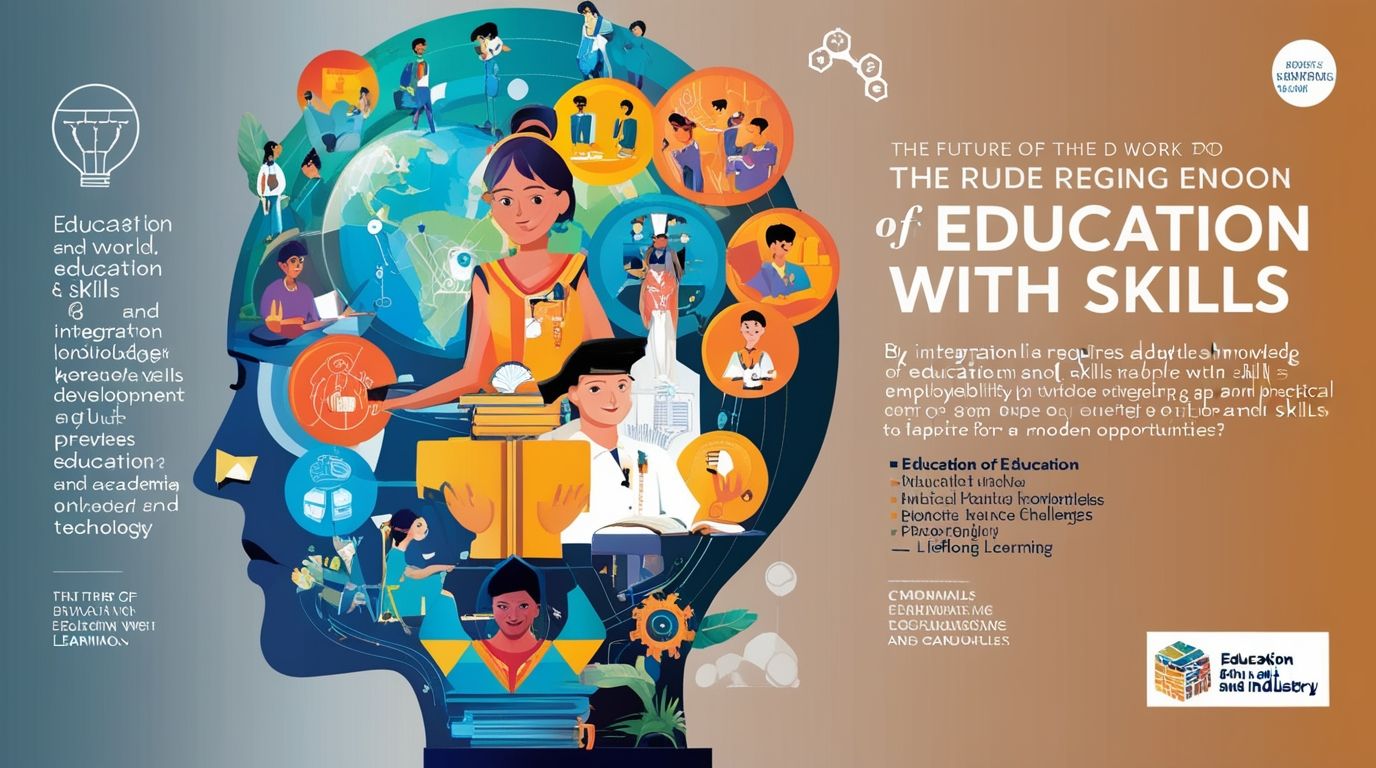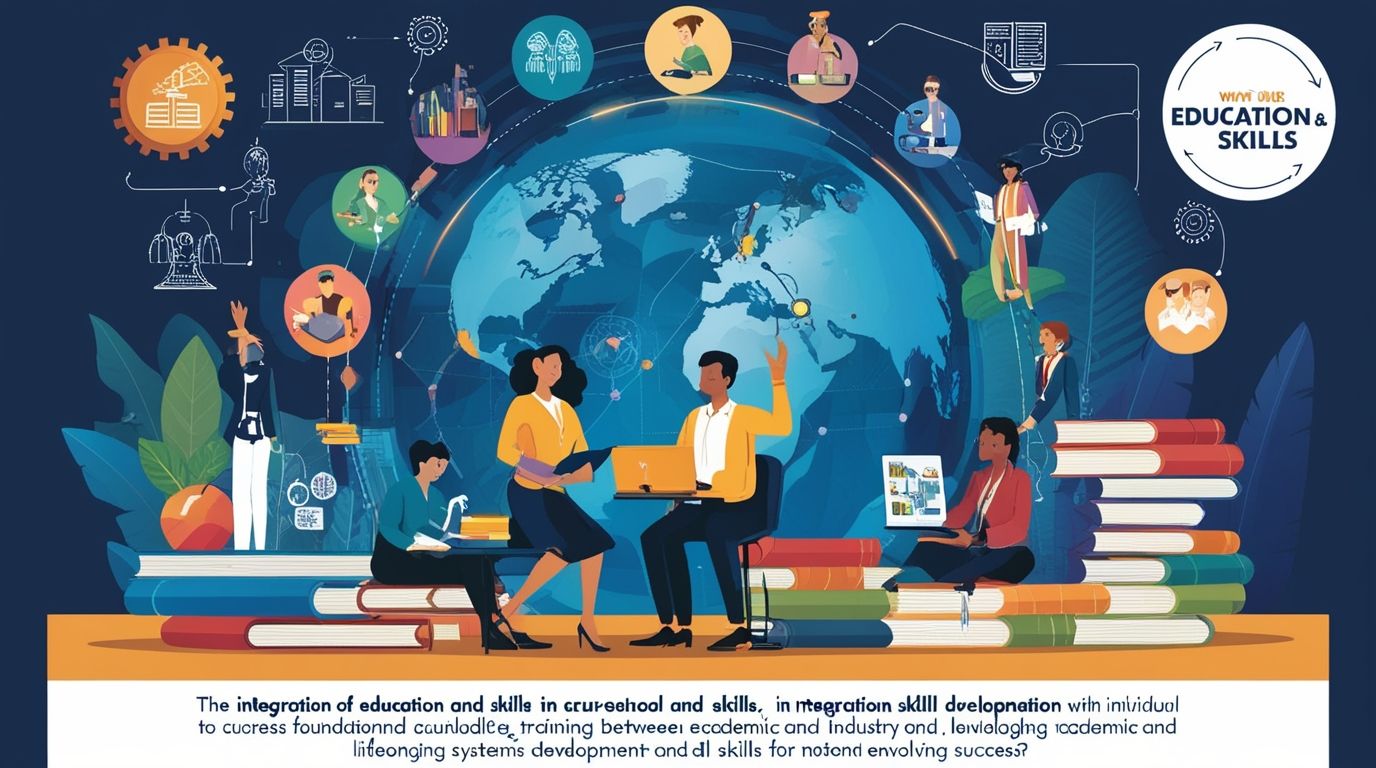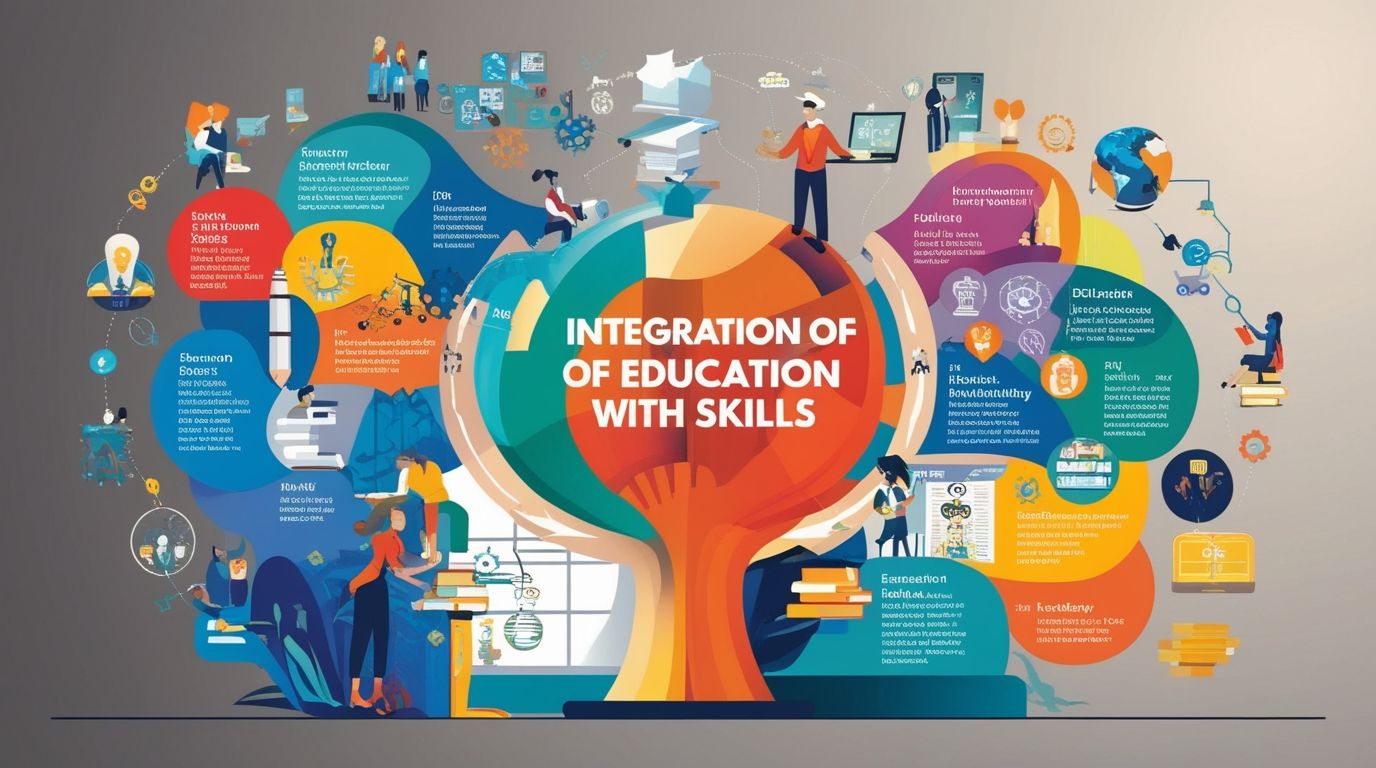Introduction
The Role of Education with Skills, Education has traditionally been viewed as the cornerstone of personal and societal development, providing individuals with the knowledge needed to navigate the complexities of the world. Skills, on the other hand, are practical abilities and competencies that enable individuals to perform tasks effectively. Combining education with skills is crucial in today’s rapidly changing world, as it enhances employability, fosters innovation, and prepares individuals for the future. This article explores the role of education in skill development, the benefits and challenges of skill-based education, and future trends in this evolving landscape.
Historical Perspective
The evolution of education systems reveals a shift from purely theoretical knowledge to a more integrated approach that includes skill development. Traditionally, education focused on academic learning, with an emphasis on reading, writing, and arithmetic. However, the Industrial Revolution and subsequent technological advancements highlighted the need for a skilled workforce, leading to the emergence of vocational education and training (VET) programs.
In the 20th century, education systems began to incorporate practical training alongside theoretical instruction. Technical schools, apprenticeships, and community colleges started offering courses that combined classroom learning with hands-on experience. This approach recognized that theoretical knowledge alone was insufficient to meet the demands of an increasingly complex and dynamic job market.

The Role of Education in Skill Development
Formal education plays a pivotal role in skill acquisition. Schools, colleges, and universities provide structured environments where students can develop both cognitive and practical skills. For example, engineering programs often include laboratory work, internships, and project-based learning to help students apply theoretical concepts in real-world scenarios.
Practical training and vocational education are essential components of skill-based education. Vocational schools and community colleges offer specialized programs that equip students with specific skills needed for various trades and professions. These institutions provide hands-on training in fields such as healthcare, information technology, and manufacturing, preparing students for immediate entry into the workforce.
The integration of technology in education has further enhanced skill development. Digital tools, online courses, and virtual simulations enable students to learn and practice skills in innovative ways. For instance, medical students can use virtual reality to simulate surgeries, while aspiring software developers can participate in coding boot camps to gain practical programming experience.
Benefits of Skill-Based Education
One of the primary benefits of skill-based education enhanced employability. Employers increasingly seek candidates with practical skills that can be immediately applied in the workplace. By combining academic knowledge with hands-on experience, skill-based education programs produce graduates who better prepared to meet the demands of the job market.
Skill-based education also helps bridge the gap between academia and industry. Collaborative partnerships between educational institutions and businesses ensure that curricula are aligned with industry needs. For example, internships and co-op programs provide students with valuable work experience, while companies gain access to a pipeline of skilled talent.
Promoting lifelong learning and adaptability is another advantage of skill-based education. In a rapidly changing world, individuals must continuously update their skills to remain relevant. Skill-based education encourages a mindset of continuous improvement, enabling individuals to adapt to new technologies and job roles throughout their careers.

Challenges and Solutions
Despite its benefits, skill-based education faces several challenges. One significant challenge is the resistance to change within traditional education systems. Shifting from a purely academic focus to a more skill-oriented approach requires significant changes in curricula, teaching methods, and assessment practices.
Policy interventions and government initiatives are crucial in addressing these challenges. Governments can support skill-based education by providing funding for vocational programs, incentivizing industry partnerships, and establishing quality standards for skill training. For instance, countries like Germany and Switzerland have successful dual education systems that combine classroom instruction with apprenticeships.
Educational institutions also play a critical role in implementing skill-based education. Schools and universities must collaborate with industry partners to develop relevant curricula and provide students with opportunities for practical experience. Innovative models, such as project-based learning and competency-based education, can help bridge the gap between theory and practice.
Case Studies
Several countries have successfully implemented skill-based education programs. For example, Germany’s dual education system integrates vocational training with academic learning, allowing students to gain practical experience while earning their degrees. This approach has resulted in low youth unemployment rates and a highly skilled workforce.
In India, the Skill India initiative aims to train millions of people in various trades and professions. The program offers short-term courses, apprenticeships, and certification programs to enhance employability and support economic growth. Similarly, Singapore’s SkillsFuture program provides citizens with opportunities to develop new skills and stay competitive in the job market.
Future Trends
Emerging technologies set to transform education and skill development. Artificial intelligence, machine learning, and automation are reshaping the job market, creating demand for new skills and competencies. Education systems must adapt to these changes by incorporating digital literacy, critical thinking, and problem-solving skills into their curricula.
The future of work will require individuals to be more adaptable and resilient. As traditional job roles evolve, education systems must focus on developing transferable skills that can be applied across various industries. Lifelong learning will become increasingly important, with individuals needing to continuously update their skills to stay relevant.
Conclusion
Combining education with skills is imperative in today’s fast-paced world. By integrating practical training with academic learning, education systems can produce graduates who well-equipped to meet the demands of the job market. While challenges remain, collaborative efforts between governments, educational institutions. Industry partners can pave the way for a more effective and inclusive education system. As we prepare for an uncertain future, skill-based education will play a crucial role in fostering innovation, enhancing employability, and promoting lifelong learning. It is essential for all stakeholders to embrace this approach and work together to build a skilled and adaptable workforce for the future.

kwv4u0
09ufnw
dys3uc
I would like to thnkx for the efforts you have put in writing this blog. I am hoping the same high-grade blog post from you in the upcoming as well. In fact your creative writing abilities has inspired me to get my own blog now. Really the blogging is spreading its wings quickly. Your write up is a good example of it.
mt10jz
Very interesting details you have mentioned, appreciate it for putting up.
заработок на аккаунтах купить аккаунт
продажа аккаунтов соцсетей профиль с подписчиками
профиль с подписчиками профиль с подписчиками
маркетплейс аккаунтов соцсетей площадка для продажи аккаунтов
аккаунты с балансом платформа для покупки аккаунтов
маркетплейс аккаунтов https://kupit-akkaunt-top.ru
заработок на аккаунтах покупка аккаунтов
Sell Pre-made Account Account Trading Platform
Sell accounts Account Selling Platform
Social media account marketplace Account Exchange Service
Account exchange Purchase Ready-Made Accounts
Accounts market Account Market
Buy and Sell Accounts Verified Accounts for Sale
Account marketplace https://buyagedaccounts001.com/
Sell Pre-made Account Account Selling Platform
Account Acquisition Account Trading Platform
Buy accounts Sell accounts
account market account trading platform
account purchase account market
secure account sales account market
find accounts for sale buyaccountsdiscount.com
secure account sales online account store
buy and sell accounts guaranteed accounts
account sale marketplace for ready-made accounts
account selling platform buy pre-made account
account store buy account
verified accounts for sale social media account marketplace
buy accounts accounts marketplace
account catalog account market
guaranteed accounts account buying platform
buy account account selling service
accounts marketplace account selling service
accounts market website for buying accounts
sell accounts social-accounts-marketplace.org
account purchase verified accounts for sale
account marketplace guaranteed accounts
accounts marketplace buy pre-made account
account purchase ready-made accounts for sale
account buying platform account acquisition
sell pre-made account social media account marketplace
account catalog buy and sell accounts
account purchase marketplace for ready-made accounts
account buying service buy and sell accounts
account buying service account buying service
buy accounts account market
account market accounts marketplace
sell accounts account market
marketplace for ready-made accounts https://buy-best-accounts.org/
database of accounts for sale https://social-accounts-marketplaces.live
profitable account sales accounts-marketplace.live
account market account marketplace
account exchange service https://buy-accounts.space/
verified accounts for sale buy-accounts-shop.pro
fascinate este conteúdo. Gostei muito. Aproveitem e vejam este site. informações, novidades e muito mais. Não deixem de acessar para aprender mais. Obrigado a todos e até mais. 🙂
find accounts for sale https://buy-accounts.live
account exchange service https://social-accounts-marketplace.live
buy and sell accounts https://accounts-marketplace.online
gaming account marketplace https://accounts-marketplace-best.pro
продать аккаунт akkaunty-na-prodazhu.pro
маркетплейс аккаунтов соцсетей https://rynok-akkauntov.top/
биржа аккаунтов https://kupit-akkaunt.xyz/
покупка аккаунтов https://akkaunt-magazin.online/
купить аккаунт https://akkaunty-market.live/
покупка аккаунтов https://kupit-akkaunty-market.xyz
продажа аккаунтов https://akkaunty-optom.live
маркетплейс аккаунтов https://online-akkaunty-magazin.xyz/
биржа аккаунтов akkaunty-dlya-prodazhi.pro
биржа аккаунтов https://kupit-akkaunt.online/
buy facebook profiles https://buy-adsaccounts.work
cheap facebook account https://buy-ad-accounts.click
buy facebook account https://buy-ad-account.top
buy facebook ad account https://buy-ads-account.click/
buy facebook old accounts https://ad-account-buy.top
buy old facebook account for ads https://buy-ads-account.work
buy ad account facebook buy facebook ad accounts
facebook ads account for sale https://buy-ad-account.click
Предлагаем вашему вниманию интересную справочную статью, в которой собраны ключевые моменты и нюансы по актуальным вопросам. Эта информация будет полезна как для профессионалов, так и для тех, кто только начинает изучать тему. Узнайте ответы на важные вопросы и расширьте свои знания!
Подробнее – https://medalkoblog.ru/
facebook ad accounts for sale https://ad-accounts-for-sale.work
google ads agency accounts https://buy-ads-account.top
old google ads account for sale buy google ads verified account
facebook accounts to buy https://buy-accounts.click
buy verified google ads accounts https://ads-account-for-sale.top/
buy google ads invoice account https://ads-account-buy.work
buy aged google ads accounts https://buy-ads-invoice-account.top
google ads account buy https://buy-account-ads.work
google ads account buy https://buy-ads-agency-account.top
buy google adwords accounts buy adwords account
buy google ads account https://ads-agency-account-buy.click/
facebook business account for sale https://buy-business-manager.org
google ads accounts buy google ads threshold account
buy facebook ads accounts and business managers https://buy-bm-account.org/
buy fb bm https://buy-business-manager-acc.org/
verified bm for sale buy facebook bm
buy verified business manager buy facebook business manager verified
verified business manager for sale facebook bm for sale
facebook bm account buy https://buy-business-manager-verified.org/
buy verified business manager facebook https://buy-bm.org/
facebook bm buy facebook business manager for sale
facebook bm buy buy-business-manager-accounts.org
buy tiktok business account https://buy-tiktok-ads-account.org
buy tiktok ads accounts https://tiktok-ads-account-buy.org
buy tiktok business account https://tiktok-ads-account-for-sale.org
tiktok ads account buy https://tiktok-agency-account-for-sale.org
tiktok ads agency account https://buy-tiktok-ad-account.org
buy tiktok ads accounts https://buy-tiktok-ads-accounts.org
buy tiktok ads accounts https://buy-tiktok-business-account.org
tiktok ads account buy tiktok ad accounts
tiktok ad accounts https://buy-tiktok-ads.org
whoah this weblog is excellent i really like reading your posts. Keep up the great work! You already know, many persons are hunting around for this information, you could aid them greatly.
I was wondering if you ever considered changing the structure of your blog? Its very well written; I love what youve got to say. But maybe you could a little more in the way of content so people could connect with it better. Youve got an awful lot of text for only having one or 2 pictures. Maybe you could space it out better?
facebook ad account buy accounts for sale account marketplace
facebook account sale gaming account marketplace account trading platform
It’s hard to find knowledgeable people on this topic, but you sound like you know what you’re talking about! Thanks
I¦ve been exploring for a bit for any high quality articles or weblog posts on this sort of house . Exploring in Yahoo I eventually stumbled upon this web site. Reading this information So i am glad to convey that I have a very good uncanny feeling I discovered exactly what I needed. I such a lot definitely will make sure to do not disregard this site and provides it a glance regularly.
Can I just say what a reduction to find somebody who actually is aware of what theyre speaking about on the internet. You undoubtedly know how to deliver a difficulty to gentle and make it important. More individuals must learn this and understand this side of the story. I cant believe youre no more widespread since you undoubtedly have the gift.
Your home is valueble for me. Thanks!…
Your house is valueble for me. Thanks!…
I truly appreciate this post. I¦ve been looking everywhere for this! Thank goodness I found it on Bing. You’ve made my day! Thank you again
you have a great blog here! would you like to make some invite posts on my blog?
My Page – I learned something new today—thanks to this article.
View Blog – This is the kind of content people genuinely need.